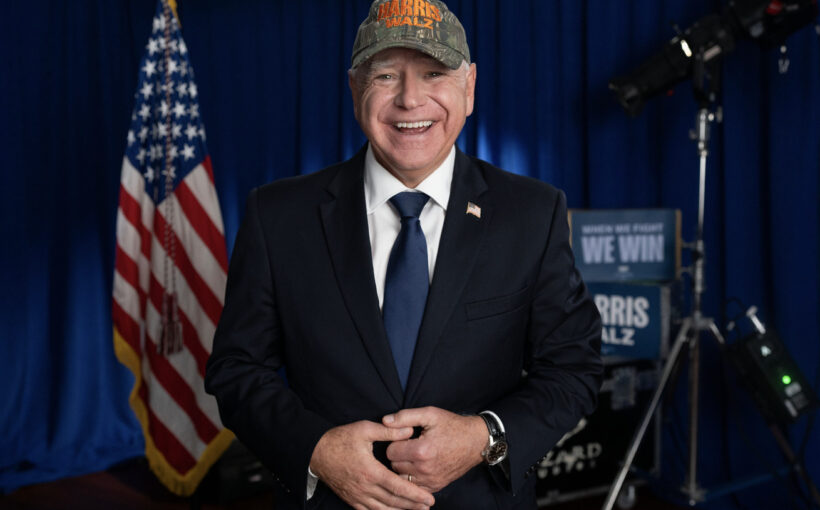If viewers were expecting fireworks, such as those in September’s presidential debate between Kamala Harris and Donald Trump, last night’s debate between vice-presidential hopefuls J.D. Vance and Tim Walz was a damp squib.
It offered those tuning in a welcome return to a less fevered (and fairly respectful) political discourse about policy issues, although it still presented opportunities for both candidates to make errors and attack the opposing presidential candidates.
This was the last television debate before the election on November 5, so this was the final chance for the teams to spar on policy positions in this format and at this length. It was also the first extensive opportunity for Vance and Walz to go head-to-head, despite some previous online engagement.
The debate had been previewed by some observers as potentially crucial to the result of November’s election because the race is currently so close. However, it would appear that neither side damaged the cause of their opponent, nor made major gains.
In a reaction survey immediately after the event, a CBS poll claimed that 42% thought that Vance had won, while 41% thought that Walz could claim victory, with the remainder undecided. So overall it was too close to call, a bit like the election result more generally.
Walz felt fairly flat
Before his appointment, Walz had reportedly warned Harris that he was a terrible debater, and it was clear from the start that Vance was more at ease on stage.
Despite this, Walz did a fairly good job, although he did flounder a little when pressed on foreign policy. When asked about whether a Harris presidency would support a pre-emptive Israeli strike on Iran, Walz ducked the question.
“What’s fundamental here is that steady leadership is going to matter,” Walz said before arguing that a “nearly 80-year-old Donald Trump talking about crowd sizes is not what we need in this moment”.
In comparison, Vance committed a second Trump administration to wholeheartedly supporting Israel and ended by stating that during his presidency: “Donald Trump actually delivered stability in the world, and he did it by establishing effective deterrence,” and that “people were afraid of stepping out of line”.
Will the debate change anything?
While that might have been a point scored for Vance, presidential elections are not won on foreign policy issues and domestic issues rightly dominated the rest of the debate.
The candidates clashed on the economy, with Vance dismissing the Harris campaign’s concerns about the potential impact of Trump imposing tariffs on imports.
“Donald Trump’s economic plan is not just a plan, but it’s also a record,” he said, before adding that it was a record that “I’m proud to run on and we’re going to get back to that common sense wisdom so that you can afford to live the American Dream again”.
On immigration, Walz pointed out that Harris was “the only person in this race who prosecuted transnational gangs for human trafficking and drug interventions”.
While recognising there was an issue with illegal immigration, Walz said that Vance was “standing with Donald Trump and not working together to find a solution”.
Arguably, the discussion about abortion was where Walz made the biggest inroads. He used personal stories, in much the same way as Harris did in the presidential debate, to highlight what he said was a “basic human right”.
Vance admitted that the Republican party was not trusted on the issue and instead said that Republicans want to make it easier for families to afford to have a home and raise children. When he accused the Democrats of being pro-abortion. Walz responded: “We’re pro-women.”
Unlike previous presidential debates, the fact checkers were rarely called into action but both candidates were given opportunity to address errors that they had made in the past.
Walz admitted to being a “knucklehead” and corrected his previous claim that he had been in China during the Tiananmen Square protests in 1989, when he had not arrived in China until several months later.
Vance addressed suggestions that he had called Trump America’s answer to Adolf Hitler earlier in his career. He was wrong, he said “because I believed some of the media stories that turned out to be dishonest fabrications of his record”.
Where Vance might have done better in persuading viewers to vote for him and Trump was when he was questioned directly by Walz about whether he believed Trump lost the 2020 election.
“”Tim, I’m focused on the future,” was Vance’s response which Walz called “a damning non-answer”.
The key takeaway from last night’s debate was that politicians could engage in polite discourse and be civil to each other, something that has been lacking in recent years.
After the debate, both candidates shook hands and patted each other on the back and introduced their wives to their opponent. Gone were the personal attacks which were replaced with respectful acknowledgement of opposite numbers. This was a refreshing change to the bitterness and name calling that has scarred politics for almost 20 years. Although it made for sedate viewing.
The lack of any bombshell moments means the debate is unlikely to have the major impact that commentators predicted. But both candidates would have been happy with their performances.
Walz did not damage the momentum that Harris has built since her appointment, but neither did he really add to it.
Vance, on the other hand, is unlikely to win any Democrats over to his way of thinking, but certainly showed the Maga faithful that he could be Trump’s successor beyond the next election.
![]()
Dafydd Townley does not work for, consult, own shares in or receive funding from any company or organisation that would benefit from this article, and has disclosed no relevant affiliations beyond their academic appointment.



